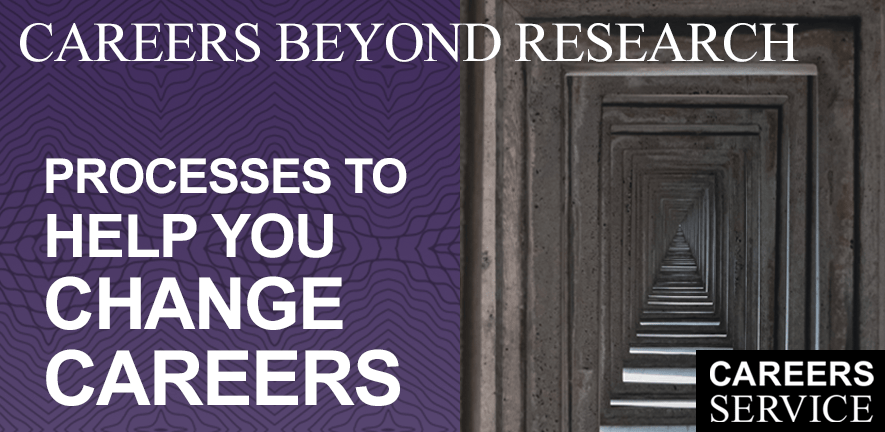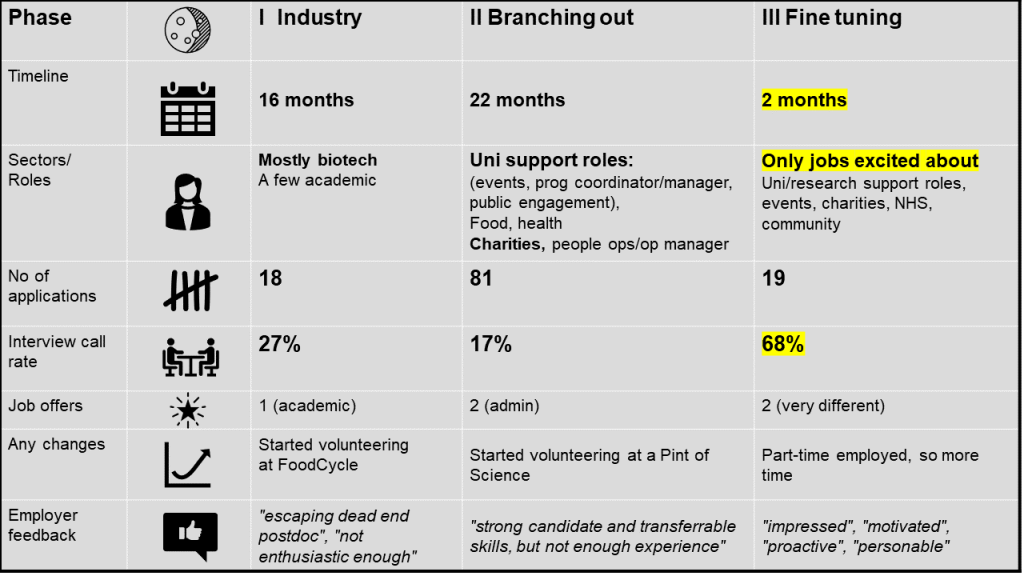 Anne Forde, Careers Consultant, highlights some of the take-home messages from a guest speaker at our Careers Beyond Research event.
Anne Forde, Careers Consultant, highlights some of the take-home messages from a guest speaker at our Careers Beyond Research event.
The process of making a career transition from research to a non-research role
At our recent Careers Beyond Research Event, Dr Maria Carvalho described the process of her career transition from academia. We were so impressed with the amount of research, analysis, soul searching and reflection that Maria put into her job hunting that we have summarised her advice on how to approach the process of moving beyond research.
Determine why you want to leave academic research
Most people find there are push factors. Maria reflected on hers, summed up with this telling statement: “I was finding that research was emptying my cup, and I had to do activities outside of my long working hours to refill it.” This exercise isn’t just about the negatives as the flip side of the push factor can be the pull factor to something else. Maria found volunteering, socialising and organising a Pint of Science (science communication events) re-filled her empty cup and that offered her clues for future career ideas.
Maria really saw results when she “only applied for jobs I was excited about”.
What is out there and what do you like doing
Understanding the obvious career paths is a decent starting point but you may find you are not drawn to them or spend your time shooting ideas down. Maria started to really think about the tasks she liked doing in research and outside her job and in what roles these are needed. Her examples included putting events together, which could translate to a scientific events role and supporting teams behind the scenes, which could align with an operations coordinator role.
No direct work experience but draw on your transferrable skills and strengths
Don’t let a lack of formal work experience for areas you are interested in put you off. Maria thought of the skills and expertise she had that could be applied to the roles she was interested in. She wrote down examples which were useful in her applications and interviews. She took a ‘strength’ test, which determined the skills and attributes that energise her. Taking the results with a pinch of salt, she was curious about what jobs might use her top strengths as these would likely be jobs she would enjoy and be good at.
Finding meaning in a new role
A clear priority for Maria was finding meaning in a future role. What issues or employers might allow her to stay true to her values of giving back to the community and be impactful? Using the Japanese concept of Ikigai, Maria looked for the overlap between what she loved doing, what she’s good at, what the world needs and what she might be paid for. This may not be for everyone, but for Maria it was a great way to find purpose in a future job that’s grounded in reality.
Gather the data and be your own data analyst
Maria got organised and created a mega job application spreadsheet where she documented all the jobs she applied to, how far her applications went and any employer feedback. She looked for patterns and highlighted the roles she got excited about, irrespective of the application success. Her second batch of data was a bank of interview questions. She grouped them in themes which kept coming up and documented her example that best demonstrated her suitability, so that she could use it for future applications.

Three job hunting phases with different results
Looking back, Maria could see three phases in her process of making a career change as seen in our illustration. Phase I was when she applied for roles near her expertise. She secured interviews for about a third of the jobs she applied for which, in itself, is a high ‘call’ rate. But employer feedback demonstrated that her push factors for leaving academic research were working against her with comments like “not enthusiastic enough” and “[you are] escaping dead end postdoc”. The next phase where she branched out into non-research roles the feedback was more positive: “strong candidate and transferrable skills, but not enough experience” but her interview call rate fell to 17%. Where she really saw results was when she “only applied for jobs I was excited about”. In two months her interview call rate jumped to 68% which converted to two job offers, and a few temporary/freelance offers. Maria was clearly impressing employers with comments like “motivated”, “proactive”, “personable” and “impressed”.
A landing pad job which paid off in confidence boosting
In between phase II and III, Maria gained confidence taking short term roles in university admin and co-ordination of an online university training school. It may have been a pay cut but she could quickly see how she was adding value to the departments she worked in with her transferrable skills and positive attitude.
Phase III acceleration – 2 job offers in 2 days!
In the end, she landed two job offers in two days. Each needed different skill sets, both of which she possesses (coordinating, data analysis vs. relationship building, kindness, giving personalised advice). Maria described it as “an agonising choice”.
Both roles, however different, aligned with her values, so she wrote down and weighted pros and cons of each job. She clarified her goals and priorities by talking it through with people she trusted.
In the end, she went with her gut and decided to step outside of her comfort zone (the “university bubble”) and use her interpersonal skills and community engagement background to help people improve their wellbeing – as a social prescriber in NHS primary care.
You will learn a lot about yourself in the process, and what is important to you.
Looking back, what’s Maria top advice and our take home messages
It is uncomfortable, she admits, but you will learn a lot about yourself in the process, and what is important to you. Don’t be afraid to cast a wide net at first to gain experience, but make sure you start narrowing down the type of jobs you are really excited about, and focus on those – the difference will show!
Ask for input from others but remember stay true to what you want from your career.
If you are moving to a job which doesn’t need a PhD you may face questions about being “over qualified” so know your why.
Maria had a few months of unemployment, so she recommended having an emergency fund for this. Alternatively, start early and use her approach to accelerate your search.
It is worth to take the plunge, she says, if research is no longer serving you. There are lots of other avenues out there once you start looking around. If nothing comes out of it and you decide to that research is actually for you this is also a positive outcome.
